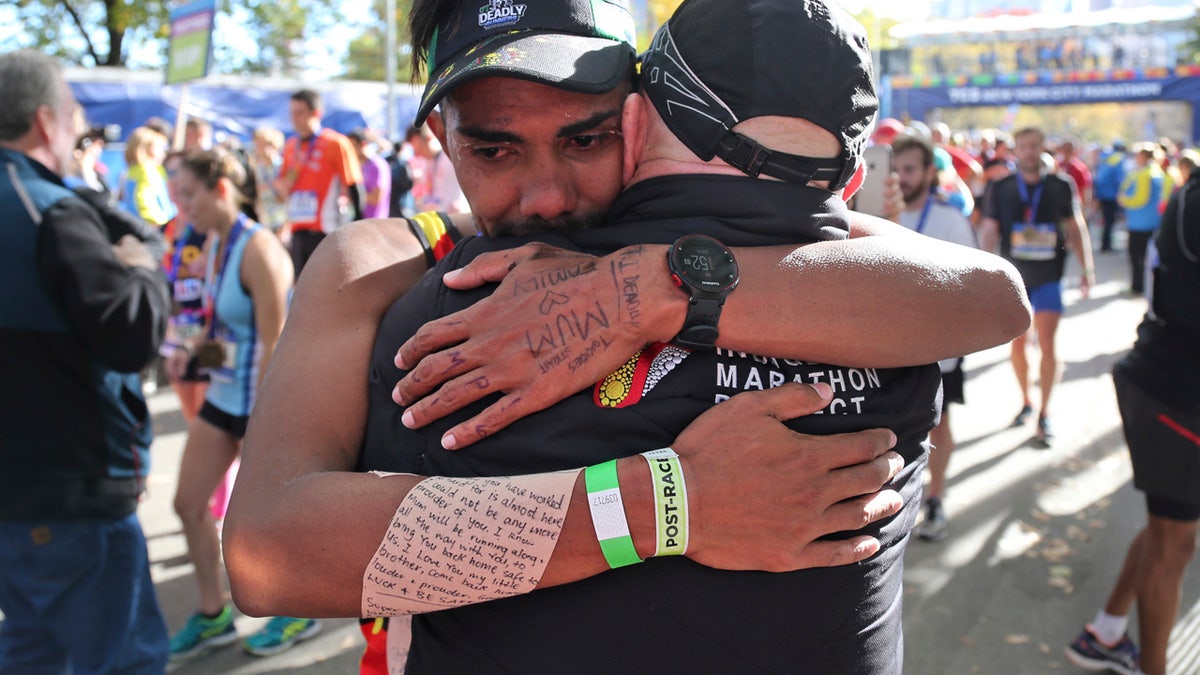
Saliman Binjuda of Thursday Island, Australia, hugs Robert de Castella, founder of the Indigenous Marathon Foundation, at the finish line of the 2016 New York City Marathon in New York, Sunday, Nov. 6, 2016. (The Associated Press)
NEW YORK – A dozen young Australian runners from indigenous tribes once targeted for genocide had a different marathon goal: "The finish line is just a start for us."
So said Robert de Castella, a onetime top marathoner who trained them for Sunday's New York City Marathon.
Running a marathon for their first time, the runners will need their new physical and mental prowess to return home and tackle the life-threatening problems of their Aboriginal and Torres Strait Islander peoples, he said. Generations of abuse at the hands of European colonizers have left many indigenous Australians with a 20-year life expectancy gap due to addictions, mental health illnesses and other diseases, plus heightened suicide and incarceration rates, said de Castella.
The 12 Australians — representing their country's indigenous population of almost 1 million, or 3 percent — were raising funds for the Indigenous Marathon Foundation that de Castella started about six years ago.
"When I saw firsthand what was happening, I was ashamed of our country — and I also saw the opportunity to use the power of running," de Castella said.
The Australians were among a field of about 20,000 foreigners from more than 120 nations running the 2016 race dominated by foreign winners. Mary Keitany, of Kenya, and Ghirmay Ghebreslassie, of Eritrea, won this year's race.
One proud Frenchman, who had run the Paris race in the past, conceded that he preferred New York.
"New York is more magical," said Vincent Dogniaux. "You feel more support from the crowd here. It's bigger, livelier and more emotional."
Seydou Kane, of Niger, said he was "so proud" to be representing his west African country. He said he didn't think twice about running his first New York marathon instead of another big urban one.
"Of course, c'mon! Iconic, this is the city that never sleeps," he said. "The crowd, the stamina - one of the runs that's a must-do and that's it."
As the first three of de Castella's fierce runners wrapped up Sunday's race, he concluded: "The harder something is, the better, because you need to have a purpose to do incredible things."
De Castella brings a new team to New York each year, after each member competes for a slot.
"I live in a place where poor health killing people is the norm," says Zideon Fielding, 22, a health worker from a community of 300 in the Australian desert. "I thought if I tried the marathon approach, I could create change, with drive and persistence.
Megan Highfold, an Aboriginal attorney, said she's the daughter of a man who was forcibly adopted by a white family to wipe out his heritage.
"I want to use my marathon skills to help people make changes, to manage mental health in a good way," she said. "It's all about now."








































